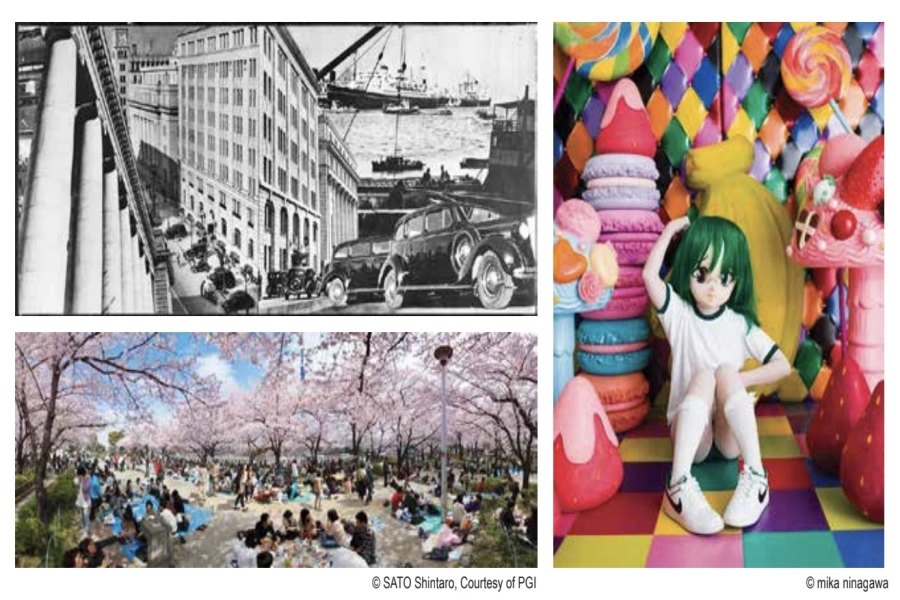Nepal is changing. And so is its taste in fashion. There is now a growing craze among Nepalis for superior quality brands that are made in Nepal. Many of these brands have not only flourished in Nepal but have also been able to make a mark in the global market. Anu Shrestha is the founder and designer of one such brand that has been gaining steady popularity in the recent times. Kallisto Designs is her clothing brand that makes amazing hand-painted silk wears and accessories.
Shrestha claims that she had always been interested in art. She loved drawing, and cutting little pieces of paper and sticking them together. Her mother would have to constantly remind her to keep her room neat and tidy, as she would mess it up everyday while making various crafts.
“To show that my room is neat, I would quickly brush all the tiny pieces of cloth and paper under my bed,” says Shrestha. According to Shrestha, her sisters still talk about how messy she was with her craft works as a little kid.
But now all those small pieces of paper seem to have come together. “It feels like years of dedication and hard work have finally paid off. The mess I used to create as a child has been beautifully transformed into my artistic clothing design,” says Shrestha.
In Greek, Kallisto means ‘the most beautiful’ and Shrestha claims that her designs are nothing less than that. Every design she creates is made of hand-painted silk and she personally ensures that the equality of each product is carefully monitored and thus up to the mark.
The Kallisto Designs’ studio, that is located at Red Cross Marg in Kathmandu, has huge a collection of hand painted silk saris, kurtas, tops, and kaftans. Although Shrestha has been working in this industry for more than two decades now, Kallisto Designs was only established two and half years ago. But in this short span of time, the brand has been able to establish its identity and is known for its high quality products in the national as well as international market.
Fashion events in Asia

After studying fashion and textile designing, Shrestha got to work with an Indian brand where she groomed herself. “Studying design and implementing it in real life are two different things. After completing my education, it took me five more years to understand this field practically,” says Shrestha.
Shrestha has a team of about 20 people working with her. They are expert artists, teachers, and designers who have specialized in hand painting and designing silk fabrics.
“None of our designs are printed. They are all hand painted,” says Shrestha adding that making every piece of fabric at Kallisto Designs is very labor intensive. “If you see five colors in one flower it means five artists are working on that one flower at the same time. This is important to make sure that the paint does not dry while creating the design,” she adds. The store uses different varieties of silk such as crepe silk, georgette silk, chiffon silk, and satin silk to create their unique and distinctive products.
According to Shrestha, she had three primary motives behind establishing her own brand. Firstly, she wanted to create employment in the field of fashion in Nepal. Unlike other studios, her brand does not import clothes from abroad and sells them in the local market. She has a group of men, women, interns, and specialized artists working with her whom she personally trains and guides. She intends to create of group of skilled craftsmen and artisans who can take the fashion industry forward in Nepal.
Secondly, through her products and her work, she wants to prove that Nepal also can create superior quality products. “Nepal is known for creating products that are low in quality and are not export-worthy. I want to deconstruct that notion and export my products in the international market with pride,” says Shrestha.
And lastly, Kallisto Designs wants to build a community of workers who can cultivate silk in Nepal. That way, Kallisto Designs aims will reduce import of raw materials and enhance our nation’s prosperity as well.
Shrestha says the inspiration for her designs comes from almost everywhere. She gets inspired by the people she meets on a daily basis and even from the places she visits. According to her, one just needs to be a little alert and excited about the work one is doing. And then it’s not impossible to come up with new and unique ideas and designs.
Being a designer and an entrepreneur in Nepal might not be easy but, according to Shrestha, she had learnt how to eliminate the word ‘difficult’ from her dictionary. “I never take any obstacle as a hurdle in my path. I would rather take it as a challenge and turn it into an opportunity,” she says adding that it may be difficult to get things done in Nepal due to lack of resources and raw materials but there will always be a solution to any kind of problems.
Shrestha advises young designers to have a vision of their own. She believes if someone is determined to do something, nothing is impossible. They will eventually find a way. She says fashion is not just about ramp walks and photo shoots, there is a lot of hard work that goes behind it. And that is one of the main things young designers should understand. “Your brand is not going to become popular overnight. You need to work hard and be patient and dedicated if you want to be successful in what you do,” she says.
In the future, Kallisto Designs aims to open a new showroom and create a wider range of designs its customers. “I’m working on more exciting and unique designs. I’m hopeful my customers will love it as much as they have been appreciating the ones that are out already,” she concludes.
Some highlights of what Kallisto Designs has to offer
Kathmandu
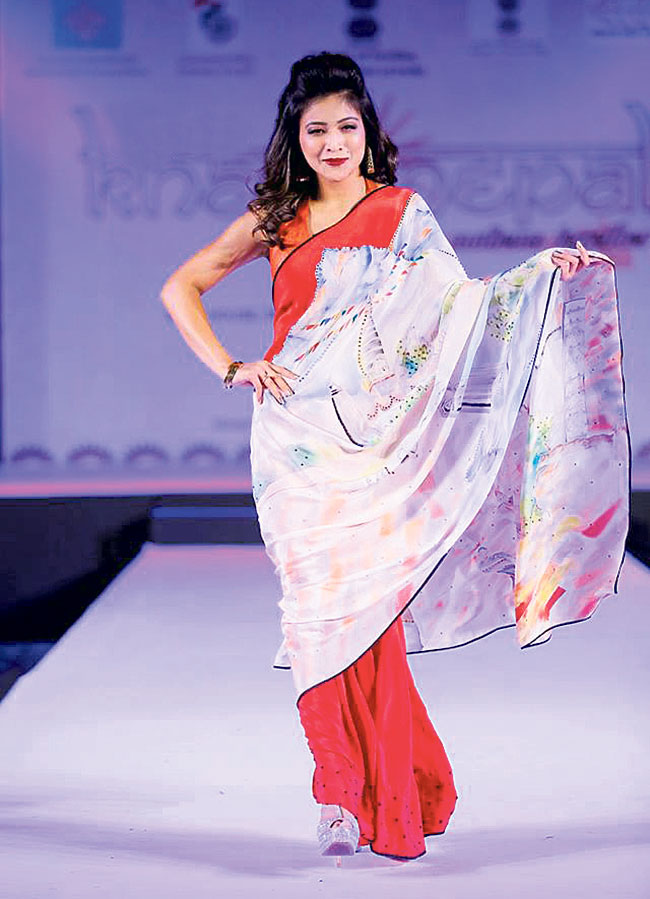
This sari is a part of Shrestha’s ‘Kathmandu Collection’. The crepe silk sari is inspired by the rich heritage of Kathmandu. Various monuments such as Dharahara, Kathmandu Durbar Square, and Swayambhu have been hand-painted on this garment. Here Shrestha is trying to bring the art, color, and forms of this 600-years-old city into contemporary fashion. The red color of the sari is also symbolic of Nepali women, and their power and strength.
Abstract Sari
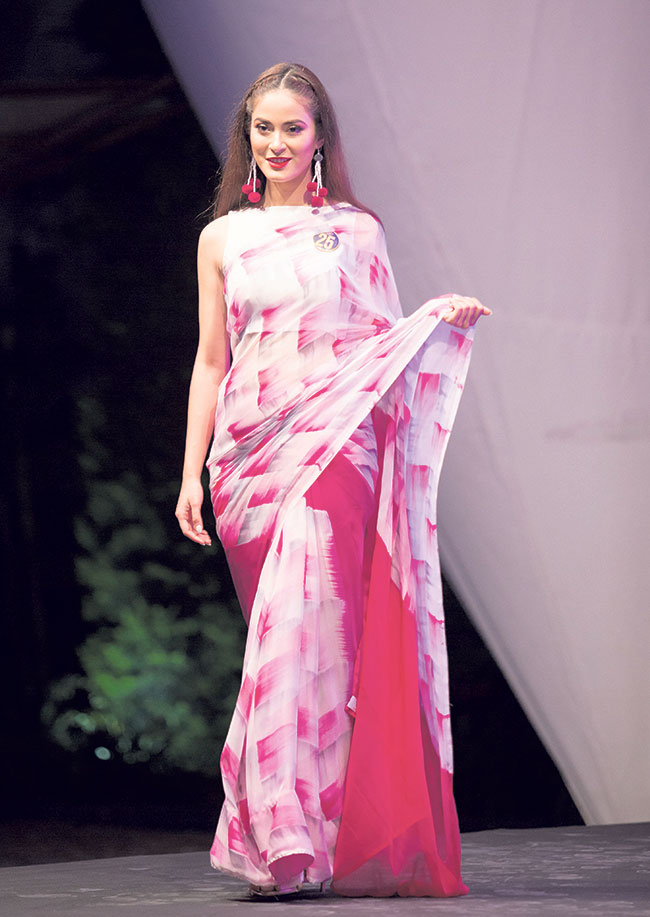
In this sari, Shrestha has tried to blend the colors of different kind of flowers to give it a very summery look. This chiffon sari is also loved my many young women who want to make a bold statement through their clothes. Shrestha designed this sari keeping in mind the cheerfulness and bold spirit of today’s youth to bring about a change in our country.
Poppy Flower

This sari is a part of Shrestha’s ‘Summer Collection’. This is a crepe silk sari that represents a garden full of flowers. Shrestha has always been very fond of bright colors and beautiful gardens. So this is her way of paying a tribute to the beautiful nature that has always inspired her.
Black Mandala
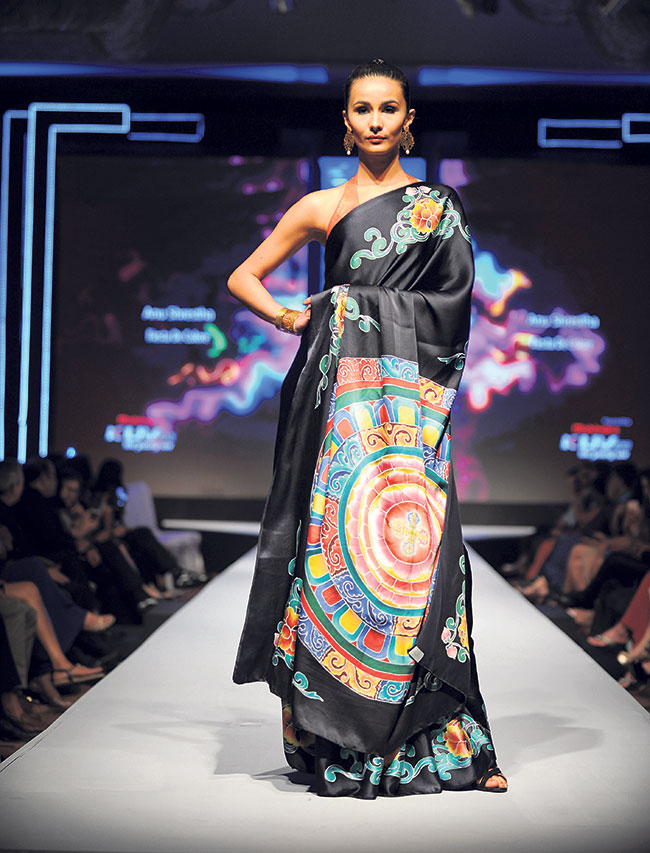
Mandala is a spiritual symbol in Hinduism and Buddhism that represents the universe and human life. The hand-painted Mandala on this satin sari depicts the circle of life. According to Shrestha, making a Mandala design on a piece of fabric is extremely complex and requires a lot of hard work. But the end result is always beautiful. Such is our lives. Our lives be very complex and difficult but, at the end of the day, it is extremely beautiful too.
Necklace
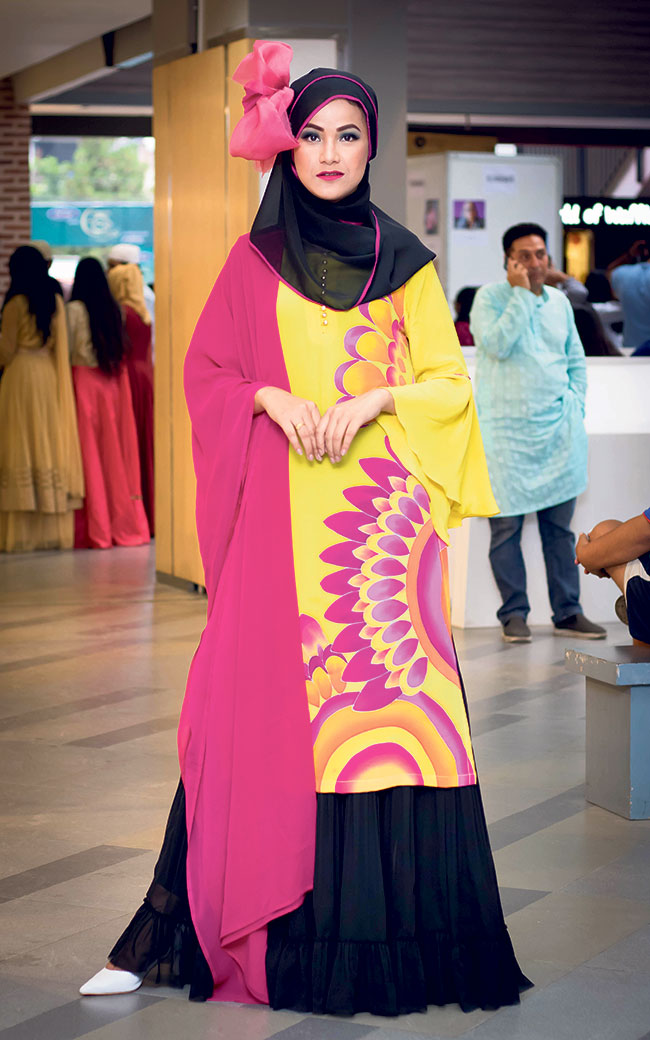
This design is from Shrestha’s ‘Hijab Collection’. Here she tries to give a modern touch to the traditional Hijab of Islamic religion. The top is a kurta with an abstract design that looks like a necklace. Underneath the kurta is a one-piece dress. This look has been accessorized with a big organza flower to give it a modern and a quirky look.




